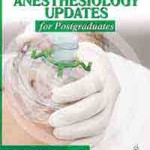The first book of its kind—no such title is published so far. The author is an anesthesiologist who is a renowned teacher, with a long working experience of 42 years. This small book is aimed at the young surgeons who would like to know something basic about anesthesia while developing expertise in their own field. It makes an interesting reading for all surgeons, particularly young surgeons. There is a natural question, ‘Why should a surgeon know about anesthesia?’ The answer is very simple; surgery and anesthesiology are very intimately related and interdependent fields. As anesthesiologists and surgeons work together closely in the same team, one must have some orientation about the other’s work so as to contribute their best possible in the team for the benefit of the patient. After a lot of thought, keeping in mind all that a surgeon needs to know about anesthesia, this book has been designed a little differently. The topics and chapters have been chosen in such a way that it may be useful to the postgraduates in surgery as well as practicing surgeons. All the practical aspects are discussed with their clinical relevance. A thorough and vivid discussion about operating department has been done. Less commonly discussed topics such as surgical team, surgeon-anesthesiologist relations, operation theater discipline, planning an operating department, asepsis in operating environment, co-ordination of theater work, sterilization of equipments etc. have been included. Pre-anesthetic assessment and preparation of the patient which would tell upon the ultimate outcome of surgery has been adequately dealt with. A clear, easy to understand discussion of fundamentals of clinical anesthesia has been done. The chapter “Anesthesia and Vital Organs” has been specifically included that precisely deals with the possible alterations in function of vital organs due to anesthesia. It is estimated in various studies that more than 80% of post-operative deaths occur in the immediate postoperative period. This indicates the need for caring the patient in a post anesthetic care unit (PACU). It has been adequately elaborated. This will certainly help the surgeons to easily spot and identify the anesthesia related problems in the perioperative period so that remedial steps could be taken without delay and if necessary call the anesthetic colleague for help. Little known, but important matters in the operation theater environment which are likely to have an impact on the outcome of surgery are discussed without bias. Intricate details about many aspects of ‘Operation theater work’ that are not commonly discussed are given in a lucid way. Spinal anesthesia practiced very commonly and extensively is associated with significant morbidity and mortality. There are innumerable misconceptions about that technique and for that reason it has been dealt with more elaborately. There is no substitute for ‘Asepsis’ in surgical practice, but in the modern era of antibiotics, there is a fear whether the concept of surgical asepsis is slowly taking the back bench. So, it has been dealt with more care. It is not an attempt to tell anything new, but to discuss the already known things so as to look at them in a little different angle. This enables one to enjoy knowing the intricate details and to use them for the benefit of the patients.
Download
Note: Only Surgery member can download this ebook. Learn more here!












reupload please!
fixed